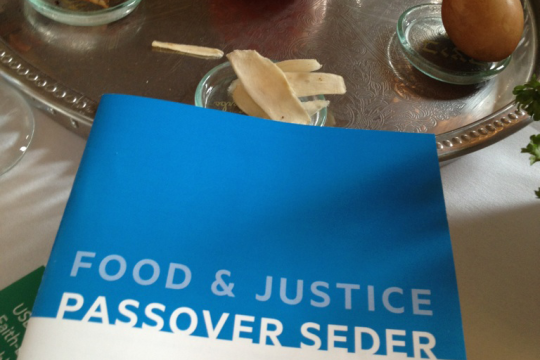By Cantor Penny Kessler
Eighteen years ago, when I first led Yizkor on Yom Kippur at my current synagogue, I admit to having been startled by an exodus from the pews. Our congregation recites Yizkor immediately after the Torah service, before the scrolls are returned to the ark and right before musaf (a supplemental service added by some Jews on holidays). I had always understood yizkor as – unlike the individuality of yahrzeit (the yearly anniversary of a death) or sh’loshim (the month-long mourning period following burial) – a communal experience. With its acknowledgment of the deaths of parents, siblings, other relatives, friends and our Peoples’ martyrs, Yizkor was something all Jews could share, especially during the overwhelming 25 hours of Yom Kippur. And yet people left. When gently questioned, most of those who left (some returning following Yizkor, some going home even though the service would continue with musaf in my relatively “traditional” shul) told me – and here I paraphrase – “my parents are alive and – well, you know … kinnehura.” (“Kinnehura” is a Yiddish term said to ward off the evil eye, or bad luck.) That other loved ones were memorialized within the Yizkor service, not just immediate relatives, specifically parents, didn’t make a difference; there was something about the spiritual power that caused people to exit.
Over time I have noticed a sharp decrease in the numbers of those who leave the room, and from my perch on the bimah, I am aware of a variety of reactions by those who stay to participate. Men and women for whom a loved one’s death is more recent seem stunned; those who remember someone from years ago seem to respond with a wistful sorrow borne of the passing of time. No one has a passive reaction because whether death touches our lives intimately or tangentially, each of our loved ones has a story. And so the Yizkor service, leading as it does to Eil Maleh Rachamim and the Mourner’s Kaddish, can and should be a musical exploration of the depths and ranges of emotion with expressions of soaring melodies, meditations and congregational tunes.
For many years I have opened the Yizkor service with “Yeish Kochavim/There Are Stars,” Jeff Klepper and Danny Freelander’s setting of the Hannah Szenesh poem.1 My goal is to gently guide worshippers into the internal exercise of memory that they are about to undergo. “There are stars up above so far away we only see their light long, long after the star itself is gone. And so it is with people that we loved, their memories keep shining…” Sung in both Hebrew and English, I use this setting to give people a chance to take a deep breath, move intellectually and emotionally from the Torah reading, and engage their memories. LISTEN
If I were able to design my own Yizkor service, I might seriously consider singing only meditative music, mantras almost, interspersed with appropriate readings and opportunities for silent reflection. Uncomplicated repeated melodies and texts would give worshippers the opportunity to join together in one or two communal voices, adding their own harmonies and allowing them to sit and reflect on the texts, sharing their own hurts, needs and healing. I would most definitely include these two mantra-like melodies. The first, “Sheviti Adonai L'negdi Tamid – I Place God Before Me Always,” was written by Wendie Bernstein Lash.2 The text is a reminder that, even in times of sorrow when it would be so easy to turn away from God in anger or despair, it is spiritually healthy and healing to repeat the idea that God is always available to be my strength and support. LISTEN Shefa Gold’s setting of “Kosi R’vaya” – my cup overflows – similarly gently allows mourners to reach into the text of Psalm 23, contemplating the myriad ways to find blessing and an abundance of love and healing from God when we are the most vulnerable.3 LISTEN
In addition to Shefa Gold’s, there are so many beautiful settings for one of Yizkor’s most familiar and beloved psalms, Psalm 23. “Mizmor L’David”4 is a lovely congregational-friendly Chassidic setting by Ben Zion Shenker, whose life and career were recently highlighted in an NPR interview. The following audio file is of me singing the first verse and skipping to the third verse so you can hear the “bridge.” LISTEN While I rarely sing Psalm 23 in English during Yizkor, I have found that even with the various translations available, worshippers still gravitate to the formal King James English translation. This setting (sung by me), by the great composer Max Wohlberg, stands out for its majestic simplicity.5 LISTEN
Gerald Cohen’s “Psalm 23” is hauntingly beautiful with a lullaby-like gentleness. Rarely growing beyond a quiet whisper, Cohen’s music is challenging for me to sing because I become so wrapped up in its emotional pull. In this audio file, you will hear the composer performing his own work; it is simply beautiful and deeply moving.6 LISTEN
Finally, we move to the penultimate moment of the Yizkor service: Eil Maleh Rachamim. A plea to God to grant perfect peace to the souls of our loved ones, I prefer settings that have minimal embellishment and synthesize the prayer of the heart with the music. Those who have participated in Yizkor have just finished several moments of reflection, and I want them to experience a soft and smooth transition to the closing moments of the service. Nothing flashy, no coloratura, just sweet wistfulness prior to reciting kaddish. The following version (sung by me) is a combination of settings by A.Z. Idelsohn, Morris Barash and George Weinflash; honestly, it is a melody that I have to come to use over time, and I take no credit other than being honored to have melodies in my head by these brilliant composers. LISTEN
- “Yeish Kochavim.” Text: Hannah Szenesh, Music: Jeff Klepper/Danny Freelander. Performed by Danny Freelander and Jeff Klepper. From: “Snapshots: The Best of Kol B'seder Vol. 1”
- Sheviti Adonai L'negdi Tamid – I Place God Before Me Always, Wendie Bernstein Lash. From “Blessing: Jewish Chants for Blessing & Healing.”
- “Kosi R’vaya.” Text: Psalm 23, Music: Shefa Gold. From “Chanscendence”
- “Mizmor L’David.” Text: Psalm 23, Music: Ben Zion Shenker. Recorded by P. Kessler
- “Psalm 23 – The Lord is my Shepherd.” Text: Psalm 23, Music: Max Wohlberg. With permission of Ashbourne Music Publications. Recorded by PK.
- “Adonai Ro’i.” Text: Psalm 23, Music: Gerald Cohen. From “Four Songs on Hebrew Texts: Adonai ro'i (The Lord is my shepherd)” sung by the composer
Related Posts
Image

Passover 2024: The Three Central Messages of Pesach
The Exodus story is the master narrative of the Jewish people. As most of us know, it tells the story of the Hebrew slaves in Egypt and the rise of Moses as their liberator. It reminds us that in 2024, the universality of Passover's three-part message again reverberates through the generations: freedom, love, and justice.
Image

Modern-Day Plagues of Injustice and Inequality
On Passover, we recount the Ten Plagues that were inflicted upon the Egyptian people. Here are some of the "plagues" and injustices that afflict our present-day society -- and actions you can take.
Image

Setting Your Leaders Up For Success
It's board nomination season again! Time to compile lists, get recommendations, and start calling the future leaders of your congregation. The URJ has resources, advice, and initiatives to set you and your board up for success.